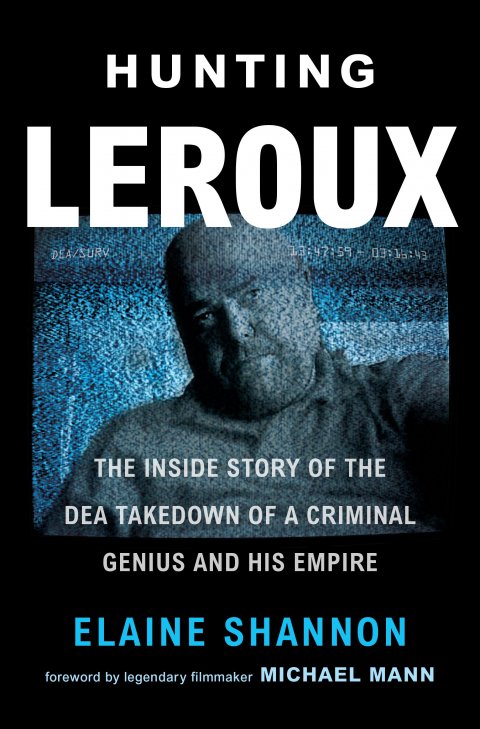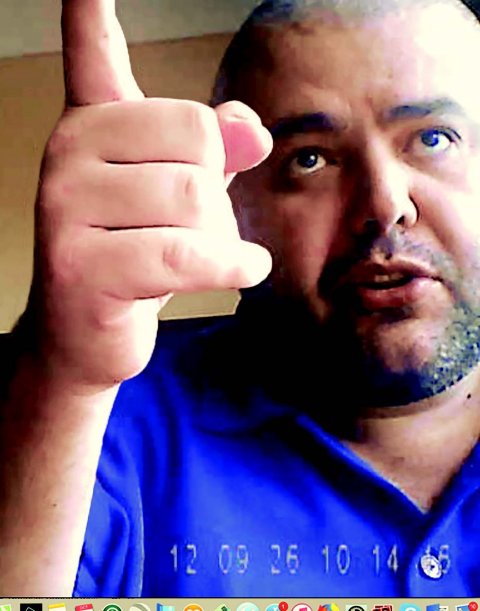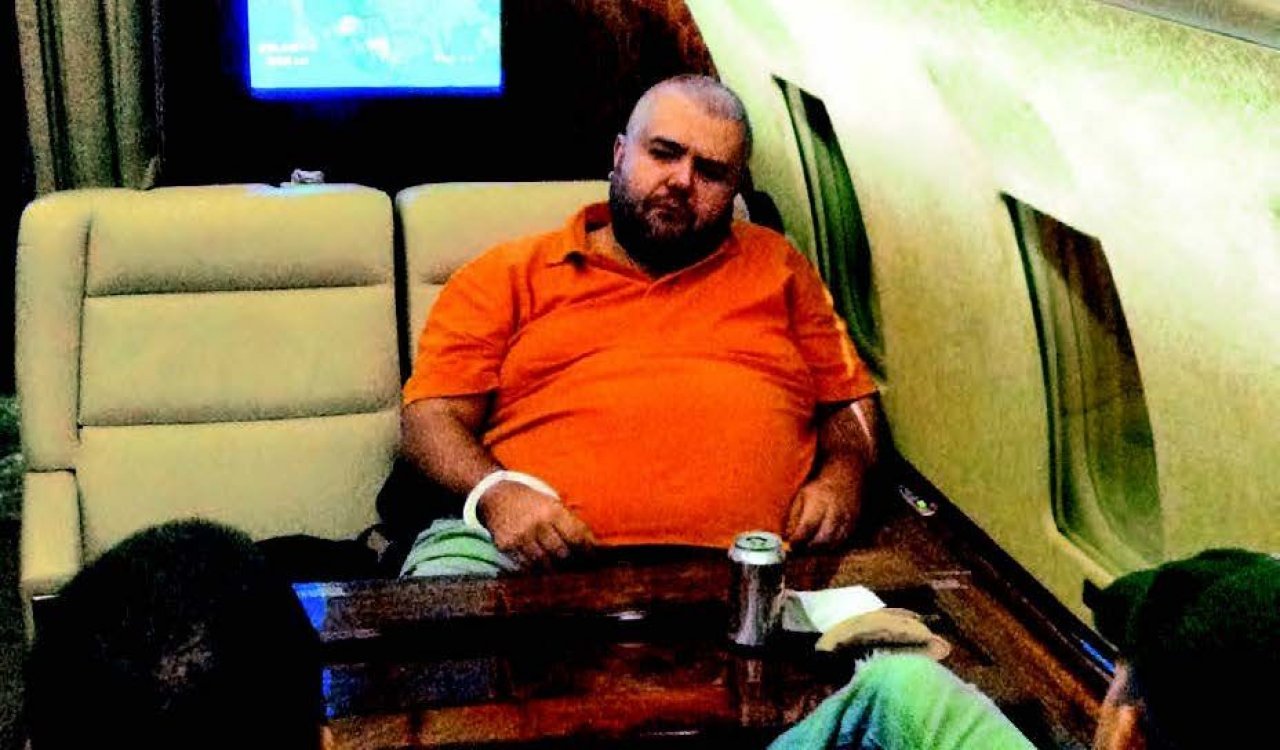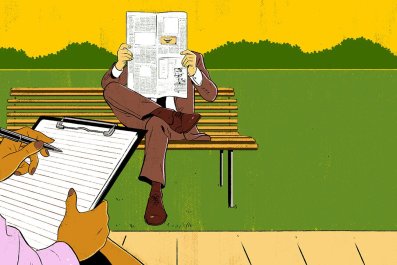She could rightly claim to be the Boswell of thugs and drugs. A veteran former correspondent for Newsweek and Time, Elaine Shannon emerged as a leading expert on the evil alliances of drug kingpins and corrupt officials with her tingling, real-life 1988 thriller, Desperados: Latin Drug Lords, U.S. Lawmen, and the War America Can't Win, which was adapted by acclaimed filmmaker Michael Mann for his Emmy–winning NBC miniseries Drug Wars: The Camarena Story and its Emmy–nominated sequel, Drug Wars: The Cocaine Cartel.
Now, Shannon and Mann have teamed up again to bring her latest investigative tour de force, Hunting Leroux: The Inside Story of the DEA Takedown of a Criminal Genius and His Empire (William Morrow), to a theater near you.
How did you get onto the story of Paul LeRoux?
I was in Afghanistan, writing about the world heroin trade and how it finances war and terrorism; the Taliban, as far as I can tell, is 90 percent funded by heroin. One of my contacts told me about this very strange but powerful figure that he had been investigating. I took a quick right turn and found out everything I could.
LeRoux was a pioneering criminal—just extraordinary. He went way beyond what we normally thought of as a drug dealer. You describe him as wanting to be Pablo Escobar plus Russian arms dealer Viktor Bout plus Jeff Bezos. You also compared him to Marlon Brando in Apocalypse Now, with anti-aircraft emplacements on all sides of his place in Manila. Is that what made LeRoux different from any other big-time drug kingpin?
That and more. In 2004 had a stroke of genius, which was somehow realizing that Americans were getting tired of cocaine. The numbers for people using cocaine were down and opioids were coming in. People didn't call them that yet—they called them prescription drugs—but LeRoux somehow sensed an opportunity to do two things that Americans love to do and will spend a lot of money doing: pills and online shopping. He was the first person to traffic in pills, and he was way ahead of the curve.
But he didn't start with opioids, correct?
Right. He specifically avoided them to get his business going. But once he had raked in about $300 million in proceeds, he told his associates, "We're going to move into opioids, big time." That was around 2010 or 2011, and he started dealing with the Sinaloa cartel to move massive amounts of an opiate called tramadol across the border—4 million pills in one blow.
You describe an alternate world that's really chilling—essentially a pool of murderers and criminals for hire that has been created by wars going back even to the Balkans.
I first heard the term "Mercenary Facebook" from a white South African former intelligence officer who is now in the security business—a white hat guy. He told me there are a lot of people who met during the wars, or during military training, who transitioned into security jobs—and by security I mean mercenary.
In Afghanistan, I met people who were in special operations from different governments and military services. They told me we're going to have a problem because there are these people out there who have been well trained, they enjoy action and adrenaline, and they're not going to be content pushing contracts or running electronics services. They yearn for action. Well, there's only so many jobs of that description, and one of them was working for LeRoux.

Most people haven't heard of LeRoux. Why is that?
When Americans think of drug lords, they think of colorful, thuggish characters with diamond guns, pretty women and fancy houses south of the border. President Trump thinks that, and, inexplicably, he believes a wall will stop people like that. Well, the whole drug trade has completely changed. It's intermingled with the arms trade. The money is going to China or Lebanon. The Lebanese syndicates are hooked up with the Colombian cartels. LeRoux pioneered what we've got now. That's causing our opioid crisis.
And there's another reason we haven't heard of him: After the DEA quietly arrested him in Liberia six years ago, they boxed him up and put him to work helping them track down his criminal associates.
Right. His presence, activities and organized crime empire—which spanned every continent—was kept secret to enable agents to prosecute his henchmen. LeRoux had hitmen running around the world; one of the mercenaries just sent me an email and wants to talk. They haven't rolled up his entire network.
Really? You were contacted by one of his hit men? LeRoux admitted to seven murders and terrorized those he suspected of insubordination. Does this mean your life is in danger?
I hadn't thought about that. I was more concerned about one of the informants in the case, frankly, because LeRoux is a vengeful character. Everybody who has investigated him, and everybody who knows him, thinks that he's got vast piles of money socked away somewhere. He had a condo in Hong Kong, and he was putting money into the Chinese banks. The Hong Kong authorities seized a big pile of gold and a stockpile of ammonium nitrate, but we don't know that they've gotten everything because we don't know what we don't know.
Once LeRoux gets into the general prison population and is able to communicate more freely with the outside world, we also don't know what he's going to do.
LeRoux didn't seem to want to accumulate and flaunt the proceeds of his criminal life. He was a guy who was determined, in a very smart way, to keep a low profile. Pretty hard for a guy who weighs 350 pounds.
Yes, though LeRoux does love women. He's had a lot of them—nobody knows how many. He thinks he's had 11 kids by seven women, but there could be many more. He liked those kinds of luxuries.
LeRoux is not a highly educated man in terms of universities, but he is educated enough. He graduated from a technical school in South Africa. He was born in what was then colonial Rhodesia, and his father was a professional in the mining industry. His first job after he graduated from the technical school was in London. He took his significant coding skills and found work with banks, law firms and government ministries all through Europe. He worked in Seattle and in Virginia. He worked in Australia and Hong Kong. He is a sophisticated man with property all over the world, and he knows how to disappear
.

How was LeRoux able to hide so much money?
He used Hong Kong a lot. I've learned from DEA agents that the banking centers for the underworld now are Hong Kong and Dubai. LeRoux was also dealing in a lot of gold—a good way of laundering money.
He comes across as a man with no conscience. In 2008 or 2009, LeRoux diversified from pills into arms and made deals with the Iranians. He offered to produce a guidance missile system for them.
He also wanted to sell small smart rockets to African warlords, Asian warlords and people that might enjoy having something to menace their neighbors with.
And he was in the meth business with the North Koreans, which uses drug money to finance its weapons program.
LeRoux acquired a batch of their meth that turned out to be 99.7 percent pure. He boasted on undercover tapes about how much a North Korean lab could produce—tons a month. I added it up to maybe a billion dollars a year on the street.
Has he ever expressed any remorse?
I am not aware that he's ever expressed any remorse about anything except getting caught. There are prosecutors who called him a psychopath in court. The definition of a psychopath, which is pretty broad, is somebody who has no conscience, who can't empathize. It's not madness—it won't save you from getting time—but it's a quality of mind where the only thing you don't like is if you can't get something.
You book goes a long way towards reversing the public image of DEA agents, and particularly the highly compartmented special operations unit known as the 960 Group.
I didn't know anything about the group until I started researching LeRoux. It's a highly specialized, built for tracking a global underworld menace like LeRoux. I'm convinced there does exist what I call Middle Earth—a vast underground network of an alternate economy with a lot of bad people doing bad things and trading with each other. We just don't recognize this economy or these characters until something terrible happens.
What finally got LeRoux caught?
He didn't like dealing with the Sinaloa cartel [in Mexico]; he called them lazy and greedy, and they overcharged him. That's why he [turned to] the Colombians; he thought they were cooler, sexier and better businessmen. But that's what did him in. LeRoux thought he was going to meet with a Colombian cartel chief; in fact, it was a Colombian American cocaine dealer the DEA had caught and flipped—he was on Team America.
Where is LeRoux being held?
In a presentencing facility in Queens, New York. His [current] status is as an incarcerated person and a government witness. He will keep that status until all appeals are exhausted in the case of the three hit men who went to trial and were convicted last year.
LeRoux is looking at a minimum of 10 years and a maximum of life. Viktor Bout—the arms trafficker LeRoux was emulating and aiming to replace—got 20, 25 years; the government asked for life. In this case, LeRoux has been very helpful in rounding up his hit men and his North Korean meth team, but the prosecutors can make recommendations. Ultimately, though, what to do with him is up to the judge.
I'd assume there are other LeRouxs out there, in this criminal Middle Earth you describe.
Yes, they just haven't been caught. The world is less stable than it was when I was a kid. War is money. And the drug and arms traffickers are investing in keeping regions unstable because it's a lot easier for them to operate. There's a huge traffic in bombs and bomb materials.
Like LeRoux, organized crime groups are becoming more entrepreneurial, more Silicon Valley in their models of innovation. And we damn sure need to be aware of it and quit imagining that we are facing thugs with a second-grade education. It is much worse, and the body count is going to keep rising.
You can find Elaine Shannon's Hunting Leroux: The Inside Story of the DEA Takedown of a Criminal Genius and His Empire (William Morrow) here.











